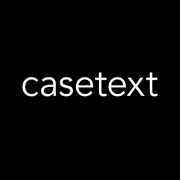AI for Legal Affairs leverages advanced algorithms to streamline legal processes, improve accuracy, and save time. Solutions range from contract analysis to case prediction, ensuring compliance and efficiency in legal operations.
The top 5 AI for Legal Affair solutions are Harvey, Leya, Spellbook, CoCounsel and Robin AI, as ranked by PeerSpot users in March 2025. Harvey received the highest rating of 0.0 among the leaders, is the most popular solution in terms of searches by peers, and holds the largest mind share of 29.2%.
AI for Legal Affairs provides tools that enhance the legal workflow through automation and data-driven insights. These solutions can analyze vast amounts of legal documents, predict case outcomes based on historical data, and improve decision-making by offering comprehensive research capabilities. They enable legal professionals to focus on more strategic tasks by taking over repetitive and time-consuming activities.
What are critical features?AI for Legal Affairs is increasingly used in industries such as finance, healthcare, and corporate law. In finance, it is implemented to ensure regulatory compliance and speed up contract reviews. In healthcare, AI aids in managing large volumes of legal documents for compliance and litigation purposes. Corporate law practices use AI to predict case outcomes and manage legal risks effectively.
Using AI for Legal Affairs helps organizations automate time-consuming tasks, improve accuracy, and enhance decision-making processes, thereby increasing overall operational efficiency.



















AI for Legal Affairs can significantly streamline contract management by automating routine tasks such as drafting, reviewing, and organizing contracts. You benefit from faster processing times and reduced human error. AI algorithms can analyze large volumes of contracts, identify key clauses, and ensure compliance with regulations, allowing you to focus on strategic decision-making rather than administrative tasks.
Can AI Help in Legal Research and Analysis?Yes, AI solutions can transform legal research and analysis by quickly sifting through vast legal databases to find relevant case laws, statutes, and legal precedents. This technology can improve your research efficiency, saving time while ensuring that you do not miss crucial information. By using AI tools, you can produce more accurate and comprehensive legal analyses.
What Are the Benefits of AI in Predicting Legal Outcomes?AI for Legal Affairs can predict legal outcomes by analyzing historical case data and identifying patterns that lead to successful outcomes. By using predictive analytics, you can evaluate the potential success of different legal strategies, helping you make better-informed decisions. It enables you to allocate resources more effectively and refine your approach based on data-driven insights.
How Does AI Enhance Due Diligence Processes?AI enhances due diligence processes by rapidly processing large volumes of data and identifying potential risks or compliance issues. You can leverage AI to automate the review of financial records, contracts, and other critical documents, reducing the time and labor typically required. This results in more thorough evaluations and informed decision-making, crucial during mergers and acquisitions.
What Role Does AI Play in Legal Compliance and Risk Management?AI assists in legal compliance and risk management by continuously monitoring legal changes and assessing their potential impact on your organization. AI tools can alert you to new regulatory requirements and help evaluate your current risk exposure. By automating compliance tracking, you can proactively address potential issues, ensuring that you adhere to legal standards while mitigating risks effectively.